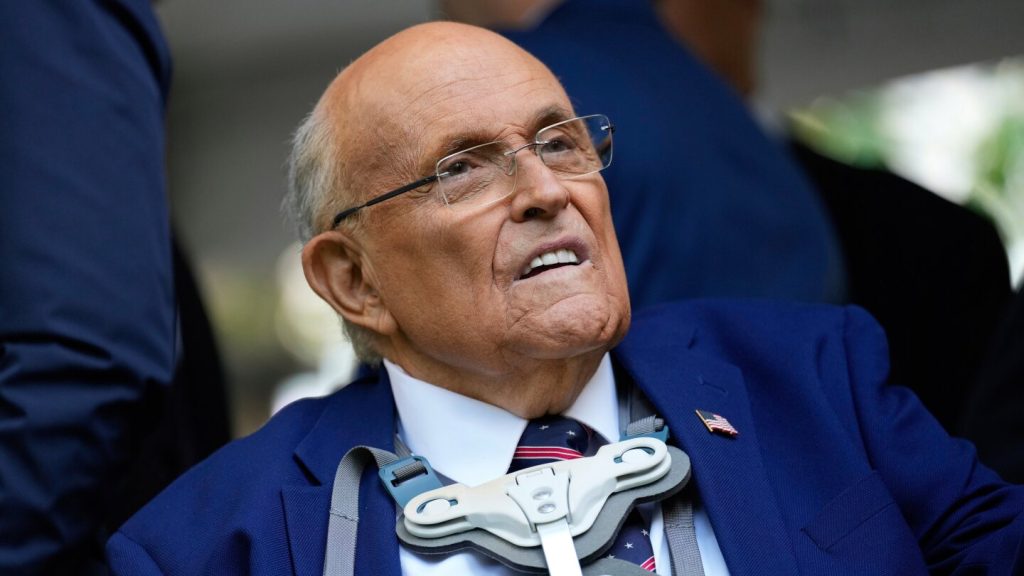Listen to the article
President Donald Trump has issued a sweeping pardon to several key allies involved in his efforts to overturn the 2020 presidential election results, according to a Justice Department official.
The pardons, described as “full, complete, and unconditional,” were signed and posted online late Sunday by Ed Martin, the government’s pardon attorney. The proclamation notably includes former personal lawyer Rudy Giuliani, former White House Chief of Staff Mark Meadows, and conservative attorneys Sidney Powell and John Eastman.
Although presidential pardons only apply to federal crimes—and none of these individuals faced federal charges related to the 2020 election—the move represents Trump’s continued determination to reshape the narrative around his electoral defeat to Joe Biden.
The proclamation explicitly states the pardon does not apply to Trump himself, who faced federal felony charges for allegedly working to overturn the election results. That case, brought by Justice Department Special Counsel Jack Smith, was abandoned in November following Trump’s victory over Kamala Harris, in line with longstanding department policy against prosecuting sitting presidents.
Beyond his inner circle, the pardon also extends to Republican “fake electors” who were charged in state cases for submitting false certificates claiming Trump had won in states actually carried by Biden. These individuals had faced various legal proceedings across several battleground states, though many of these cases had already stalled or been dismissed before the pardons were issued.
In Michigan, for instance, a judge dismissed charges against 15 Republicans in September who had been accused of attempting to falsely certify Trump as the winner in that state.
The pardon proclamation frames the prosecution of those who aided Trump’s post-election efforts as “a grave national injustice perpetrated on the American people” and portrays the pardons as necessary for “the process of national reconciliation.”
This action follows Trump’s earlier pardons of hundreds of his supporters who were charged in connection with the January 6, 2021, riot at the U.S. Capitol, including individuals convicted of assaulting law enforcement officers during the insurrection.
The pardons highlight Trump’s ongoing effort to vindicate those who supported his claims of election fraud, despite numerous court rulings, recounts, and investigations finding no evidence of widespread irregularities that would have changed the election outcome. Election officials from both parties, including Republicans in key battleground states, have consistently affirmed the legitimacy of the 2020 results.
Legal experts note that while presidential pardons are broad for federal crimes, they do not extend to state prosecutions. However, with Trump’s return to office, the practical impact is that these individuals are now shielded from any potential federal charges related to the 2020 election, even as some state cases might theoretically continue.
The pardons also raise questions about accountability for actions taken in the aftermath of the 2020 election, particularly regarding efforts to submit alternate slates of electors and pressure state officials to overturn results. Critics argue the pardons could set a precedent that undermines future electoral integrity by removing consequences for attempting to subvert legitimate election results.
The White House did not immediately respond to requests for comment on Monday regarding the pardons or their timing, which comes as Trump prepares to begin his second term in office.
Fact Checker
Verify the accuracy of this article using The Disinformation Commission analysis and real-time sources.




8 Comments
I try to stay objective when it comes to political news, so I’ll be curious to see how this pardon is analyzed from different perspectives. There are valid arguments on both sides of this issue.
While I’m not a fan of the individuals pardoned, I do think the president has broad powers when it comes to granting pardons. This will certainly be a polarizing decision, though.
As someone who follows mining and energy news, I’m not sure how directly relevant this political story is to my interests. But it’s certainly an important development that could have wider implications.
As a mining and commodities investor, I don’t have a strong opinion on this particular political development. But I’ll be watching to see if it has any indirect effects on the markets I follow.
This seems like another chapter in the ongoing saga around the 2020 election. I’ll be interested to see how it impacts the various investigations and legal battles going forward.
Hmm, not sure what to make of this. I suppose it’s within the president’s power to grant these pardons, but the timing and individuals involved are certainly controversial. I’ll be curious to see the reactions.
Interesting that the pardon doesn’t apply to Trump himself. I wonder if that’s a strategic move or if there are legal reasons it was excluded. Either way, this is sure to be a major talking point in the coming days.
This pardon seems like a controversial move that will likely stoke more political division. I’m curious to see how it plays out and impacts the ongoing investigations and narratives around the 2020 election.